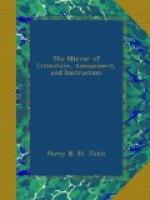Philosophy has not so much enabled men to overcome their weaknesses, as it has taught the art of concealing them from the world.
That a little learning is dangerous is one of our surest maxims. If knowledge does not produce the effect of ameliorating our imperfect condition, it were, without question, better let alone altogether; it is not to be made merely an appendix to the mind, but must be incorporated and identified with it.
They who have experienced sorrow are the most capable of appreciating joy; so, those only who have been sick, feel the full value of health.
By the expression “common people,” is meant the man of rank as well as the more industrious peasant; for in our estimate of men, the mind, and not the eye, is the most proper judge.
Some men are, of course, more original thinkers than others, but all, without exception, who hope to appear in print with any effect, must first be readers themselves. It was said by Dr. Johnson, that more than half an author’s time was occupied in reading what others had said concerning the subject he was himself writing upon.
Every man, in his more serious moments, must confess that he has done few things in the course of his life he would not wish undone; and experience must have shown him that the things he most feared would have been better ihan those he most prayed for.
Vanity is our dearest weakness, in more senses than one: a man will sacrifice every thing, and starve out all his other inclinations to keep alive that one.
The man who trusts entirely to nature when he is sick, runs a great risk; but he who puts himself in the hands of a physician runs a still greater: of the two, nature would seem the better nurse, for she will, at all events, act honestly, and can have no possible interest in tampering with disease.
A great idea may be thus defined:—it gives us the perception of many others, and it discovers to us all at once what we could only have arrived at by a course of reading or inquiry.
We are told to place no faith in appearances, yet it will be found a wiser course to judge from the human countenance rather than the human voice: most men place a guard over their words and their actions, but very few can blind the expression that is conveyed by the features.
To assist our fellow-creatures is the noblest privilege of mortality: it is, in some sort, forestalling the bounty of Providence.
There is no doubt that memory, although it may be cultivated, is originally a gift of nature; so, also, application must be regarded as a natural endowment; for there are some men, however well disposed, who can never bring themselves to grapple closely with any thing.
It has been suggested that man has no real necessity for clothing. All other creatures are furnished with every necessary for their existence, and it is improbable one nobler than them all should be left in a defective condition: there are some nations, in severer climates than ours, who have no notion of clothing; and, even in civilized life, the most tender parts of the body are constantly exposed, as the face, neck, &c.




